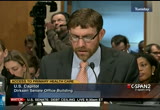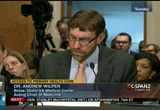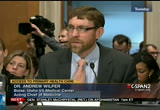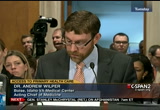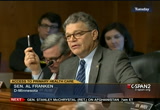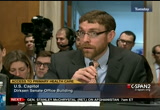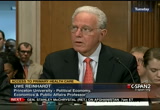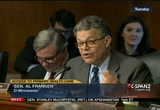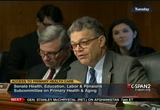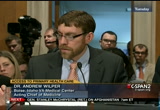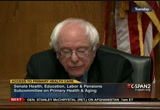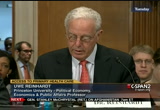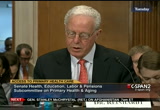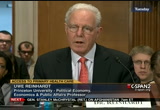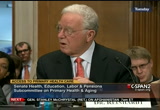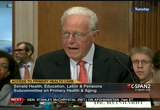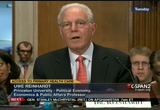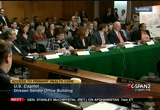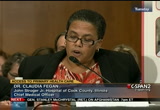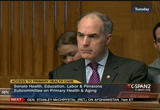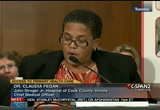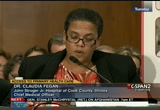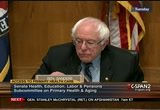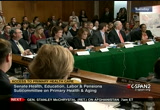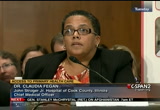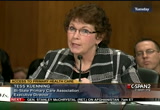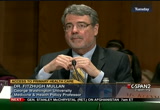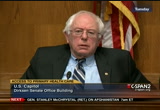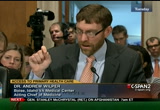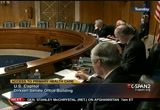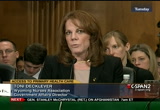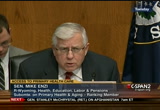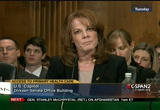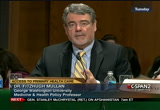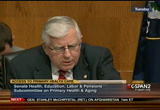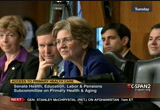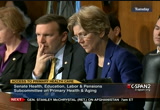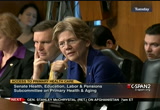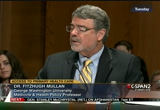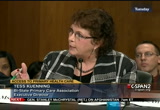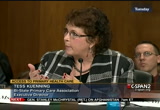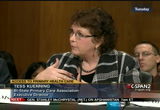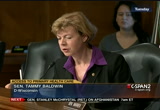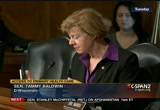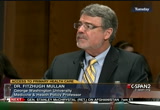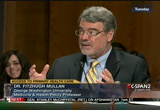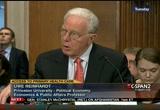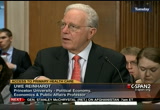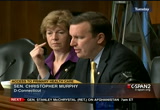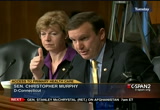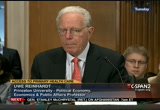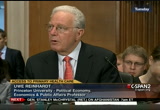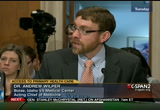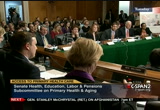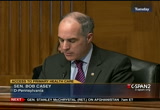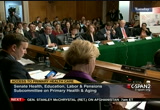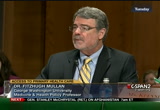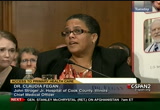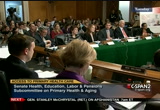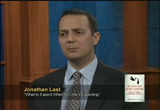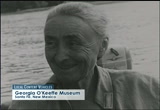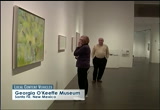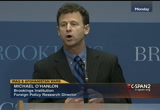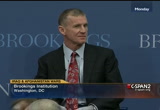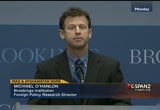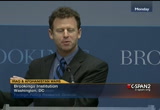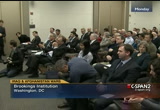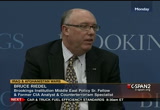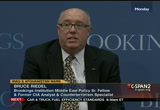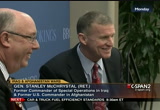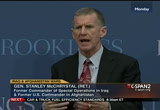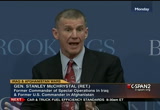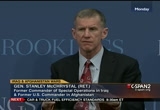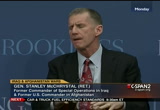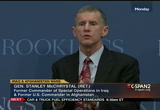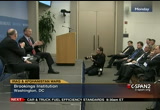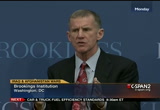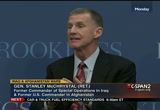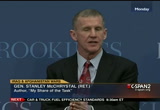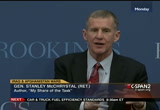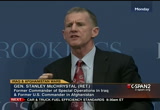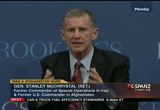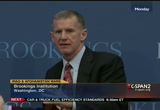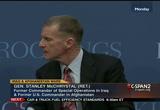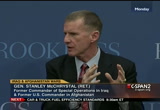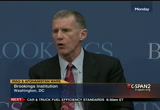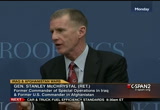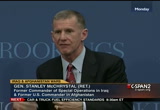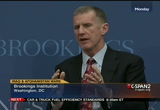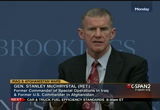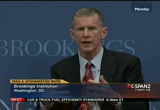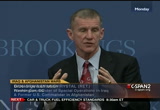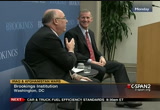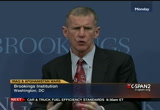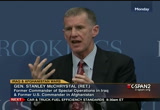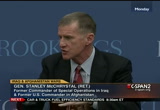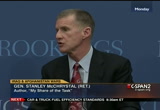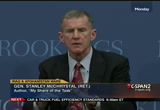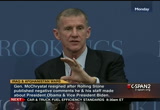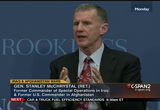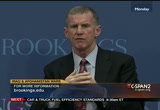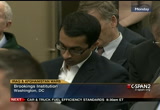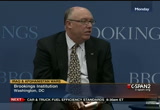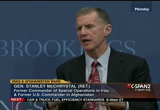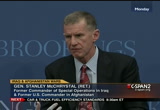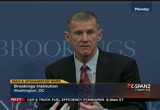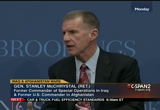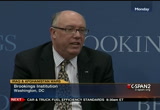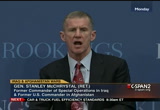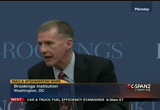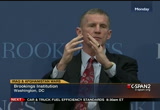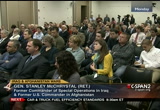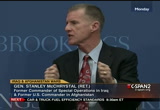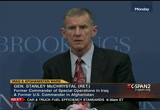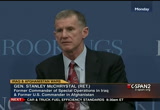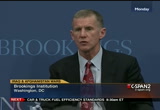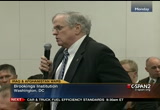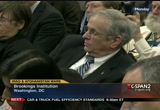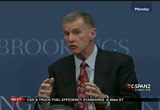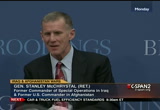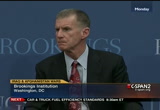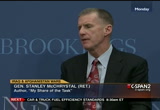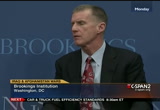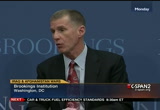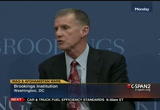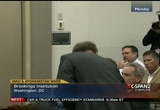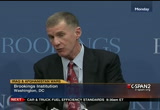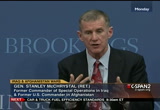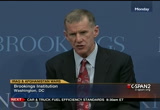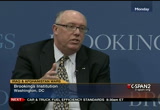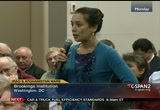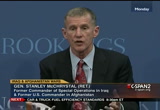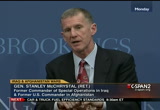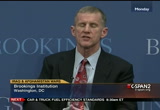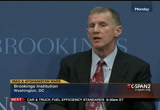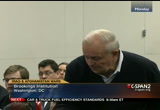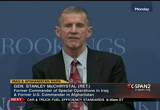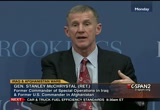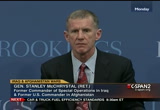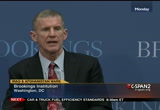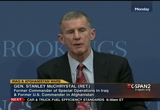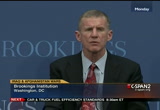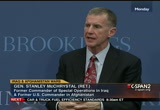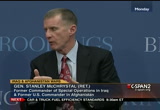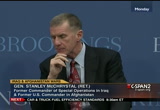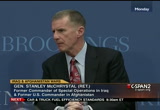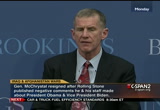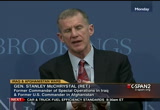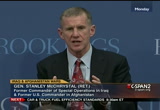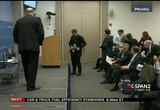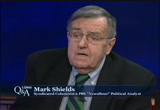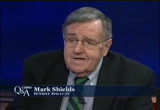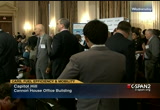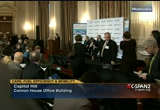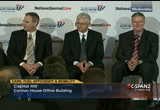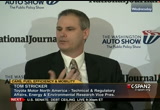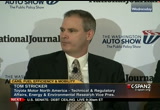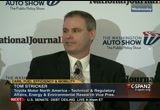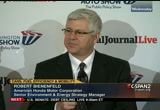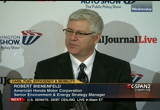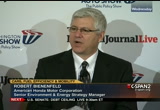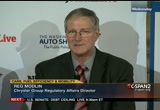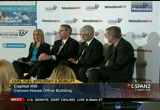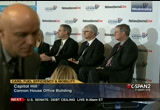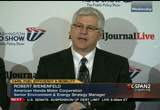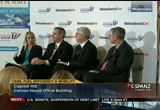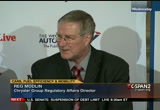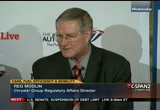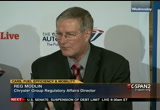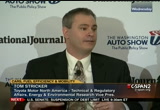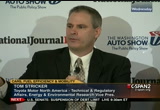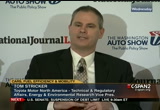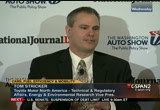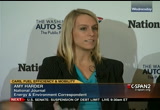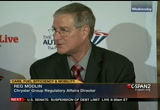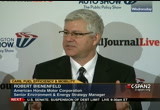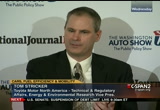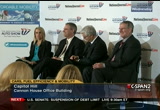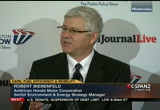tv Today in Washington CSPAN January 31, 2013 6:00am-9:00am EST
6:59 am
7:00 am
changing demographics and birthrates could change the way the u.s. is a leader. look for more booktv online, like is on facebook. >> georgia o'keeffe was really the first well-known woman artist. and even well into her life in the 1970s. there was no one who could match her. she became a feminist icon, and i grew up under the influence. my first recognition of her work was not as an art historian but as a bunning feminist whose attention was drawn to the fact those paintings. and i've lived in colorado and people talk about this woman, it was the way she lived. the fact that from 1929 forward, she came to new mexico for months out of the year, living apart from her husband. in the '30s and foresee
7:01 am
continued to do this until her husband's death. and then she moved to mexico full-time. so she lights up our imagination as an artist because she was famous so young and so famously young, ma but secondly she lived the life she wanted to live. and was a very disciplined woman. and i think that stands out as women make choices even right through to the '70s, they make choices that accommodate family and other pursuits in their life. georgia o'keeffe at one driving passion in her life, and it was her art. >> the georgia o'keeffe museum in santa fe, new mexico, just one of the places you'll see this weekend as booktv, american history deviancy spans local content vehicles look behind the scenes at the history and literary life of santa fe. saturday at an eastern on c-span2's booktv.
7:02 am
>> general stanley mcchrystal commanded special operation forces in iraq, and later was u.s. command in afghanistan until his resignation in 2010. he was at the brookings institution on monday where he discussed u.s. strategy in afghanistan and his newly published memoir. this is an hour and a half. >> good morning, everyone. welcome to brookings. thank you very much for coming out on this particular day. although it's an unusual treat with such an amazing events of general stan mcchrystal are today. i'm mike o'hanlon, one of the members of the 21st century center for security and intelligence. we are hosting this event with bruce riedel who runs the intelligence project within our center. and today's topic, as you know, is general mcchrystal's experience, particularly of the joint special operations command
7:03 am
where, for five years, essentially lived in iraq most of the time and build an organization that was already an impressive organization into what was the state-of-the-art capability. it led not to our top of today but the tracking and ultimate killing of the al qaeda terrorist al-zarqawi. but even to me the procedures that led to define and killing of bin laden a couple of years later. so the success of joint special operations command is one of the most important stories in the broader war on terror and we are honored that bruce riedel will be interesting general mcchrystal about this this month. of course, this is based on general mcchrystal's recent book, which hope you all purchased and which we're all very proud to be discussing as well today, "my share of the task" which comes i think describes the role not only of his own command but of many soldiers and other american military personnel, international personal that he worked with. just a couple more words but each of our panelists today.
7:04 am
bruce was a 30 year cia veteran before joining brookings in 2006. at the cia he did a number of things, including working at the nsc on detail and nato headquarters, the middle east and the pentagon. pentagon. he was adviser to four presidents, president obama asked them to lead his afghanistan-pakistan paula's review in early 2009, and do that for a couple of months before apple first returning to brookings. bruce has written two books in the time has been a, a third is about to come out and i will mention that in the second of the first two were about al qaeda and then about the is pakistan relationship. so the search for al qaeda, the deadly embrace, his new book coming out next month is avoiding armageddon. it's a story by the u.s.-india pakistan relationship and crisis management over the last half-century or so. general stan mcchrystal is a 1976 graduate of west point, spent 34 years in u.s. army, retiring as a four-star general the summer 2010.
7:05 am
he has been command in afghanistan. use the correct of the joint staff but perhaps the military circles most of all as i mentioned this five year period at joint special operations command makes a memorable and historic. general casey at his retirement ceremony in 2010 said of general stand, the thrill is stand has done more to carry the fight of al qaeda since 2001 than any other person in the department and possibly in the country. after that bob gates got up and the secretary of defense called him one of the finest men at arms this country has ever produced. then continued, over the past decade no single american has inflicted more fear and more loss of life on our country's most vicious and violent enemies than stan mcchrystal. but before i allow them to talk about this fight i also want to underscore because that makes stan sound pretty scary, while he was scary to our enemy, he's an amazing american who is in so much in a positive way to reach out and help build here at home,
7:06 am
working with veterans. but in afghanistan i want to share a very brief vignette, which is his emphasis on reducing civilian casualties was one of i think the most important aspects of the strategic initiatives that he brought to bear when he was commander. i had the honor of seeing president karzai in the spring of 2011, i said i would be seeing general stand center after. president karzai said to me, he pumped my hand and he said please tell stan mcchrystal that we so appreciate his service that is such a thing of the afghan people, but always appreciated the concern yet for the afghan people as he did his job as a general dealing with will with this enemy. so without further ado, please join me in welcoming general stan mcchrystal to brookings. [applause] >> thank all of you. thank you, general mcchrystal for coming as well. it is an honor and privilege to be on a platform with you.
7:07 am
90, mike, for the very generous introduction. what we're going to do is have a conversation up here for the first half or so of the hour and a half we have. i'm going to ask the general a bunch of questions, and then about 10:45, maybe a little later, we will open up for questions from you. it's particularly an honor to have you here today because this is also the maiden voyage of the brookings intelligence project. the brookings intelligence project is a new effort to try to resolve the riddle of intelligence successes and failures, or the enigma of what intelligence is sometimes brilliantly successful, and many of the times, much more publicly, spectacularly of failure. there's no better case study of intelligence success and failure, i think, the counterterrorism effort over the last decade and one of the great successes of that period is the hunt for abu musab al-zarqawi.
7:08 am
now, some of you will say here's a brookings stuck in the path. abu musab al-zarqawi was killed six years ago. why should we care about a dead jordanian? the answer is because abu musab al-zarqawi's legacy, unfortunately, remains with us today. the terrorists who this month attacked a natural gas facility in algeria, al qaeda, glorified indeed almost worshiped abu musab al-zarqawi. we know that because several hostages that were captured by this group in the past purport his most popular icon of the al qaeda group, is more popular than osama bin laden. he carried out and planned the attack in a jury is a self-described eco-ti of abu musab al-zarqawi. he sees himself as very much an acolyte of the late zarqawi. and zarqawi's organization, al
7:09 am
qaeda in iraq, has today produced an offshoot, the front in syria which promises i think to be one of the most dangerous al qaeda fronts we've ever seen. so he may be dead but his legacy is still with us. so i'd like to start the conversation, general, by asking you for your impressions of zarqawi looking back now, how serious and dangerous figure he was have a decade ago, and why he was at the top of the list of people to go after during the war in iraq. >> let me first thank michael hanlon. thanks for being here. and it's great, bruce, to see you. one heroes in terms of intelligence. and to be interrogated by the cia. i'll try not to break. yeah, abu musab al-zarqawi was a relatively young jordanian from a lower, or upper, lower upper
7:10 am
class background our lord middle-class background i guess you'd say, upper lower class, who became radicalized while in prison, and then became associated with al qaeda, right to the end of the period in afghanistan. he then later when he appeared after the invasion of iraq, he had been there before but he appeared wrote on our radar screen at the end of 2003. it already started to build an al qaeda and iraq infrastructure that leveraged fear. it's pretty important to you how we saw it. i took over in the fall of 2003, as i went to iraq and i got there in october. and immediately it was obvious to me that the situation in iraq was much worse than it. from afar. i was coming out of the pentagon. it was clearly unsettled but it
7:11 am
looked much worse than we thought. the first hope was that if we would get saddam hussein and the former regime extremists that i would solve the problem. and so we've made an effort to do that december. we picked up saddam but also became pretty obvious that as one of my describes -- one of my guys described, they really weren't running back, the beginning of the resistance there, the beginning of the insurgency. and instead what was, was zarqawi had started to build a network that took trained people, iraqi sunnis have been essentially dislocated from their position in society can sometimes position in government, sometimes position in the military in iraq, and they were terrified of the shia peralta which was going to clearly be dominant in iraq and the future. so you have this combination of factors that was fear the future, frustration against
7:12 am
foreign invaders, and then not as much religious extremism as sometimes is perceived. it was really an al qaeda religious movement. it was a political movement that it can leverage by some very clever work by people like abu musab al-zarqawi fairly early, at the beginning of 2004 we were sure he was there. we started to track his work, and, of course, in the spring of 2004 when falluja essentially highlighted the meltdown of iraq. you had violence all around the country but falluja became the first but in the country where they held ground. and actually, al qaeda and the sunni elements that were working with them at that point held at bay coalition and iraqi forces from the city of falluja for a number of months. at that point it was clear that what they have built, not only was fairly passionate, but it
7:13 am
was also extensive. the network work around most of the country. and zarqawi was an interesting role to really get to the heart of bruce's question. it was a question about, there was an issue about did he really matter. and the answer is yes, he did. he mattered in a big way, because zarqawi became an organizational leader. he also became an iconic leader. he leveraged both very well. at one point we would watch them move around the country and deal with groups, and he was very low-key, very charismatic leader. not bluster us. he was an effective in your face leader in terms of a positive sense, but he would also leverages ability to use mass media. he would put out these radio or internet talks where he would praise groups around the country. i remember one time we captured one of these different groups to the lines of show marked the -- essentially was going geographic
7:14 am
area to geographic area and pumping up the morale of the to those areas. it was pretty powerful because one, it made him look like he was solo, which he was indirectly doing but also very motivational. it made them feel like they were part of a bigger entity and he would lash into that very, very effectively. and we started to become the actual operational leader and the moral leader. and that increased over time. his goal was to create a civil war. is strategy was to get a sunni-shia schism to erupt into a civil war. and arguably he succeeded before we, in fact, killed him with a bombing of a mosque in the spring of 2006. that was the fuse that actually started what, what looked and felt up close like a civil war. so he became hugely powerful. although we killed him in mid-june, what he has done
7:15 am
carried on after that. >> you just described as you do in the book, he created a network, or a network of networks. and in the book you lay out how your task force had to create a network to go after the network. your network was a classic example of intelligence cycle at work. collecting information, analyzing information. can you give us kind of a sense of how that network work, how it evolves, how the pieces of the work? and ultimately the speed at which you were turning things around, from collection to exploitation? >> sure. i had grown up in an error when we thought of terrorist groups as fairly bounded, narrowly focused entities with a certain number of people in them and if you are able to get those people or decapitated, you would
7:16 am
essentially cause the problem to stop. at the beginning of the war against al qaeda, as bruce knows very well, we started with the decapitation strategy. it was called two plus seven, and that was osama bin laden, abu musab al-zarqawi, the next seven. if we could decapitate those organization would collapse. in reality that doesn't usually happen come as a tongue in cheek tell people, if you take out the top two people in any order they shoulshould we are apart of, wee actually collapse. in some cases i would argue you would get stronger. i used to say that in the pentagon. >> it's not a recommendation. [laughter] >> i used to say that in the pentagon and everyone would have not. the reality is if you have a very bounded organization of x number of people, you go after them and you sort of deck of cards id, you take them off and eliminate them. problem solver that doesn't apply to a networked enemy. he think what a big organization and network terrorists or decision has to do, if you see a car bomb go off in baghdad
7:17 am
against a target, somebody had to chosen to target, somebody had to build the car bomb, somebody had to assemble all the components of the car bomb. somebody had to find somebody to place the car bomb and if it's going to be driven, had to find a suicide bomber. somebody had to make the car bomb worthwhile. so what it means a worthwhile is typically they would film it and they would immediately put that them out so they got much greater value out of the explosion. so if you start to think of all these come you're talking about leadership at the top, command and control, communications, fairly rapid, logistics, sometimes very, very significant amount of logistics. when you have 14 car bombs a day going off in baghdad, it's a big logistic chain. you're talking about recruiting, assessing, training, and moving people into position. so if you've got human resources part of this thing. you're talking about security element that are doing your
7:18 am
counterintelligence work to make sure you're not -- it's a big organization that's got all the functions of a very complex organism. to do that it becomes this leading organizations that has to operate but it becomes extraordinary effective because there's a reach everywhere. and so to defeat that if you think all of got to do is get mr. big, you have missed the point. you're just not going to have the effect you think. nor can you just say i'm going to stop car bombs or and going to do this, because no single part of the. we actually back and look at the strategic bombing survey of germany after world war ii, because there was an attempt there to figure a critical note of which is get the ball bearings come if we just get the feel. what we came to the conclusion is there's no single thing. you can't just stop this and stop this problem but instead what you got to do is destroy the enemy's network, which meant for us you had to go not at the
7:19 am
very top but you have to go down to people who actually do work. in the military equivalen equivt would the field grade officer and senior ngos, and you had to claw that out, destroy that and then let the network collapse. now, to do that you've got to have a network, essentially that layers on top of that. we don't naturally do that in u.s. organizations. we have a tendency to be more stoked by. there's intelligence agencies of different types. there's military organizations special operations. this conventional organization, political part, public affairs. and we tend to be fairly bounded, special operations more traditional debit public affairs. so we would never talk about what we did. so unlike al qaeda, who would do inaction and then leverage that action to influence people's thinking, we sort of don't do that actually. we like not to talk about.
7:20 am
so sometimes we don't get the value of that. similarly, parts of the intelligence, we would gather information and know about it, we are loath to share that with the other parts of the four so i said you were the operations because the idea is we've got to protect sources, and whatnot. instead we will just give people enough information to go do something. what we found is you can do it that way. you can't have the blind may look at the elephant and one person on the tip and one of the trunk, one on the task and get a sense of how to beat it. so we had to build a network that was not only wide enough and have all the different capabilities we needed, but the types and be geographically said. then we learned had to be lightning fast. when we started, when i became involved in the fall 2003, and i write this in the book and a fair amount of detail because it's so important, i went to visit our element on the battlefield, and we had like 14 or 15 locations. we had a big headquarters at baghdad international airport. they would be out little teams,
7:21 am
great has been 15 or so operators and one intel guide and a radio, and the problem was they would be out there getting information, getting a sense of the battle, but their physical pipe, their bandwidth back to us was pretty limited but they could sing enough, make phone calls. but when it came time to send imagery, big documents, it was painfully slow. so they didn't. similarly, when they tried to draw on those things from our headquarters, they really couldn't get and what might have one intel person forward and they're so busy they don't have time to leverage all the information that the headquarters intelligence, nor do they have time to send it. so as a consequence you had these two elements that are basically spinning on their own without really being joined into the fight. and then we would have things like you go out and come and element would to a raid and they would capture joe bag of donuts, however, and they would get phones, computer document, whatnot. and those would be put in the
7:22 am
bag, a sandbag, one of the burlap sandbags or a plastic garbage bag, and they would be sent back to the headquarters with a little take on the net says here's the stuff we captured. and the problem is by the time it got back to the headquarters and taken into where we did that, it would be stacked up, and it would be exploited as we called red, and got to. when i first took over i would rent at a win in one room and there's stacks of these plastic bag. there might've been a nap in there that says this is where zarqawi is today. but we wouldn't have no no becae we were not reading those things until literally weeks later. and probably a lot never got rid. and our ability to exploit computers is one -- painfully slow. we had to send them to someone else. so the consequence, everything you've got is delayed. so speed became the relevant. if you couldn't do it fast, it was almost no point in doing it. if you couldn't interrogate
7:23 am
someone you captured from a target effectively, there's no point in doing the raid. so better just wait into you can interrogate because it's all about intelligent the i always hated to admit to people because as an operator your the one a successful mission as an operational stroke of genius but anything that fails is an intelligence failure. but jsoc became 80% intelligence. we got up in the morning thinking about intelligent. that's what i worked on the that's what the focus became. operation for something we did to get more intelligence. and intelligence is what i would say that intelligence operative is what our forward operating became the people who were traditional shooters, by 2005 and six, i thought of themselves as intelligence people who carry the guns. it was an amazing difference. >> you described with a formula at one point. five, six finish, explode and analyze. explain how that cycle worked. >> if i was to describe it in a
7:24 am
sequence commute to find a target, know about it, you have to fix it in real-time. you have to give at a certain place now. you have to finish, capture or kill the target. you have to exploit would've you get from it and yet to analyze what you have gotten. it's sort of like a progressive assembly line idea. and it makes sense because you start with it and do whatever you get the analysis, if you broad in a circle that takes you back to the fine. the problem we found is that the targeting cycle that has been used, problem solving cycle, one version of that is used in a lot of cases. but what we've done was if you take each of those elements, and thethey're performed by differet organizations, if the fine element is done by some human intelligence and signal intelligence by different agencies and then it is passed to the people who are going to
7:25 am
fix it, which is often done by aerial platforms, predators and things like that, or we send agents out to see it, if they are done by different agencies, by the time this one gives it the way they want it, because everybody wants to have a perfect finish project in a passive to the next one, it's slow and as a cultural difference in the way it is passed so it's not, we don't get 100% clarity of information. venue fixed it in real-time and then they say okay, now i'm going to pass it to the finish of force. you've got this what we called place in a system that they are time delays but they're also information delays or information lost. so the finished force theoretical is this group of big shoulders brave guys who sit in them, somebody kicks the door open and they go, number 10, you know, north street. they don't know anything about
7:26 am
number 10 north street except ago there. when they go there to do it they may be to pick up this guy. they go pick up the sky but they don't have the context, they don't have the understanding. they are hard as you so much in and they don't exactly know what you're looking for. so what we learned to do is we learned that actually the most important part of the operation was exploit and analysis. it's what you get out of the. it's what you know. what i tell everybody, the people people who in the next were, are not going to be the -- except in those the most. it's who understands fastest. it will be a fight for knowledge, and that, who ca cano that click is because essentially what iraq became, a fight for knowledge. are finish forces were the best in the world when we started, and were just amazingly good already at the. we could go anywhere with any firefight and hit any target, extraordinary. but that turned out not to be the problem. the problem was understanding what we got and driving it into more targets. so we learned that first you
7:27 am
can't have a funk a aided system with different organizations controlling parts of it am one, because nobody is completely responsible. hey, i'm doing a great job of finding, but you have to have a holistic thing which is all contained with somebody who is driving it, plus a sense that everybody is responsible and everybody gets credit. now that's harder to do but that became the core of making our network work. that became the cycle. when we started it, it might take us -- if we had a target on day one, it might take us two weeks to get that information, digested and get to a second follow-on target. i 2006, we were doing three turns the night off the intelligence from the first targeted the second two targets we would know nothing about, but we would have grabbed information, digested that information, turned that into an opportunity and moved. that became the big revolution for us. >> you not only had to of course do this all in the field, but you also had work with great
7:28 am
enemy, washington. and all the different agencies the united states government involved in intelligence, collection and analysis. in the book you talk about the cia and have a great -- the cia which are most productive partner, but also the most infuriating partner you dealt with. after 30 years i can endorse that 100%, especially the infuriating part. but like you to explain what you meant by productive and infuriating with regard to the cia. >> sure. i start off with sort of a thesis that nobody is either irrational or evil. there are few people who challenge the thesis but for the most part everybody i have dealt with, they operate rationally. if you look at the war on terror, it is an exercise in collaboration, integration, synchronization. that's all it is.
7:29 am
that's why nine 9/11 happened and we were able to stop it. all information existed, we were able to pull together. that's what i call these other operations hard. there are several levels. but first there's organizational cultures. every organization, the military has many cultures inside and different tribes. but if you pull that altogether, you say there's a general dod culture, sort of big, sort of kinetic, a little bit like a big puppy with big pause. in intelligence work, not as refined as other intelligence agencies. he had the cia, which is more refined, more professional intelligence. a bit secretive which is understandable, doesn't play well with others, which is understandable, and there are cultural equities to be protected. not just to protect credit but also because there's a worry that if we spread these things and would bring other elements and what's going to happen is,
7:30 am
we live so far effectiveness. we will lose our ability to do exactly what it is we have to do. so the consequence, you have this constant cultural tension between the cia in that case, and joint special operations command, that you have to deal with. .. >> and you start by bringing people forward and operating at a single location, and that's far from d.c. which is good, and the young people, typically young people, they tend to meld.
7:31 am
but they're always getting pulled by their home offices. not just the cia, but every different apartments. we had some participants that would come, and we'd form this joint interagency task force, and who they had sent to contribute were who they wanted out of their offices, whoever they were. [laughter] i mean, literally. there were some pretty amazingly poor talent. [laughter] on the other hand, on the other hand, other agencies would send superstars. some agencies would send people and say whatever you do, don't give any of our information, our secrets, don't negotiate our equities away. well, the thing about forming a real team is everybody's got to give away some of their equities. you've got to open up and build this. it was a multiyear process for us breaking down walls, and, of course, they get rebuilt really quickly. and had to build a lot of personal relationships. some of my closest friends in the world now are people that i started this process with that it just took us a long time to
7:32 am
develop bonds of trust. what worries me about peacetime is, obviously, what we want is you sort of all go back to your own corners. there's not the forcing function, there's not the burning platform that says we gotta cooperate. you all believe generally in the idea of cooperation, but it's not something you belief in, it's an active thing you do. it's not magnets that a come together, it's magnets in opposition, and it takes people to hold them together. and i think that will always be the days, but that's -- be the case, but that's the big challenge. >> just to note, over 30 years i saw time and time again how the creation of a new entity in the cia was always the place where anyone who didn't work out was immediately shipped off to that vitally important new entity which started with the d team instead of the a team. let me turn to some of the specific weapons or aspects of this intelligence struggle. one, of course, is the use of
7:33 am
unmanned aerial vehicles, more popularly known as drones in the united states. the drone program in afghanistan and pakistan is becoming increasingly controversial. one of the things i think your book really does well is help us orient our understanding that it started really in iraq, and that's where we began using the drone as a reconnaissance mechanism. can you talk a little bit about how important the uav became for your operations and especially the operation to find zarqawi in the end? >> absolutely. and bruce knows the background. of course, the predator, and i'll describe that, refer to a whole bunch of other aircrafts, some manned some not, gave us full-time or full-motion video. it let us watch something, essentially, with a tv camera from above for long periods. when i first got there in 2003,
7:34 am
there weren't many assets at all. you'd have a certain number of hours in a day, and there was a big fight over who'd get 'em, and we weren't sure how to use them. early you would try to cover an operation, and the beauty where covering an operation where you were going to do a raid was if you were going to traditionally do a raid, you needed 120 people, say, because 20 were going to go in the target, 100 were going to provide security, command and control around the target. when we could see around the target with clarity all the time, suddenly we realized we didn't need that 100. we could accept that risk and just put 20 on the target which allowed us to use fewer aircraft, fewer people which allowed us to hit instead of one target with 120, to hit six targets. huge change. so that knowledge, that situational awareness was a huge difference for us. the second thing it did was we learned very rapidly looking at the operation was important, but setting up the operation was
7:35 am
more important. target developed in what was really what we started to learn. and we didn't know that initially, or we didn't protect that for a time. there was an operation in fallujah in the summer of 2004. because al-qaeda and the sunnis that ran fallujah essentially were besieged there, the only way we could get inside effectively was to watch it from above. there was a little bit of signals intelligence, a little bit of human, but nothing very impressive. but we started the process very focused target development on places to learn pattern of life. we'd watch the same house or the same vehicle move. we'd chart this down and start to build an understanding of what happened as though you're above watching your neighborhood all the time. suddenly you know who hangs out together, you know the relationship. we had an operation called big ben that i touch on in the book because we captured a truck full
7:36 am
of weapons as it left fallujah and went towards baghdad, and we were able to, basically, follow that back through information to a house inside fallujah. we watched that house, we watched the comings and goingings, and we became convinced that it was a cache of weapons, all of which were being used. and so we said -- and this was one of the first times we'd identified the target with that kind of precision just from aerial observation. so we nominated it for us to do a raid, a ground raid there, put some of our delta force operatives and others on the target. at a point the decision was made not to do that. because of the fire fight likely to ensue. but we were given authority to do a precision weapons strike, a bombing raid on the target. so this was really the first proof of principle for us in this kind of environment. we made the decision in the morning well after light.
7:37 am
we conducted a strike on the house, and when it hit the target, we're literally watching, i'm sitting there -- my mom -- my stomach's in knots because it was really important to prove what we could do. and, of course, you're worried about collateral damage. civilians, what not. we got the explosion from the bomb, and there's two or three seconds of nothing, we're just sitting there going -- then suddenly secondaries go off, and they go off for about 20 minutes. it's extraordinary what we had hit in that place. that was almost the validation of what we were doing because eventually we learned we could use a combination of things, most notably the full motion video, but also a number of moving target indicators to develop pattern of life, follow people, vehicles and things, identify targets to hit. so increasingly our precision went up. when we went to a place, the percentage of time, you know, which we found and captured or
7:38 am
killed our target was extraordinarily high. and it went up the whole war. in august of 2004, my force did 18 raids in all of iraq which we thought was just breakneck pace. every other night we're doing a raid. two years later, in august of 2006 -- same month -- we did 300 raids in the month. ten a night. and yet our percentage of effectiveness on targets went up. the accuracy of our intelligence was higher, and the effectiveness of the force on the targets was higher. it was a fascinating correlation. and the more full motion video we got, at one point i got with general casey, and i said if you double the amount of full motion vook on up manned aerial vehicles we get -- we were, of course, in competition with other organizations for this -- we will more than double our effectiveness against the enemy. they did, and we did. we went up more than twice when we doubled it. it just shows the effectiveness
7:39 am
of those particular systems. >> you were, of course, fighting a great cultural war, an unmanned aerial vehicle by definition has no pilot to give a medal to. how do you make sure that the guy who is coming up with the precision plan to make sure that the right drone is in the right place at the right time gets as much credit as the soldier who actually pulls the, or the pilot who drops the bomb? >> yeah. you hit a cultural point that was really key. most of the uavs were flown from the united states, the actual people on the stick. and whether they are good people or not, they're a long way from you. and of after the operation -- and after the operation they're not in the mess hall with you, you're not getting that cultural touch. so at the beginning of the war, we had quite a disconnect. at one point we're watching this target, and suddenly the uav
7:40 am
turns around and leaves. of course, i'm losing my mind -- [laughter] and i would have choked the guy, but he was thousands of miles away. [laughter] so we asked what are you doing. he says, well, weather's coming in, and i don't want to risk this unmanned aerial vehicle. and i go, i give a shit about the unmanned aerial vehicle. let it crash. but it was a cultural difference. he'd been given one set of cry criteria, one set of what's important. good person making good decisions. absolutely wrong decision for what we needed. it would have been greater to fly that thing until it crashed if it accomplished our mission. what we found we had to do was pull them in together. we started putting our liaison sitting right next to them wherever they were flying from the united states. we started doing video teleconference, and essentially knitting them together, and this to know what they're looking for and at, they have to have the context, and they've got to get
7:41 am
credit. if they do a good job, they've got to understand they were part of the operation that did it. i went to england about 2007, and i went to their nsa equivalent, and i sat across a young female analyst. and she described her part in a individual we'd successfully targeted in afghanistan. and her eyes were burning like embers. i have not seen such passion and such pride. she felt like she was central to this thing as though she had stood over his dead body. but she had been that central. and it was really important to me that that cultural reach understand that everybody's responsible for success and, of course, for 25eu8 -- for failure as well. >> i like to remind people that as brilliant as the uav drone system is, at the end of the day, there has to be someone who tells it where to fly which in many cases, not all cases, is
7:42 am
usually a human source. in the hunt for zarqawi, it's clear that the debriefing of a detainee was vitally important to the outcome. and we know from certain movies floating around now that detainee interrogation is a very important issue. and, of course, that raises the question of how you interrogate detainees. in the book you are about as clear as anyone i've ever seen. you say torture is, quote, self-defeating. you describe the very elaborate steps you took to make sure that any detainee in your chain of command was not abused and was housed in a facility of that have, well, it wasn't a five-star hilton, but it was an appropriate facility. and at one point you said to your troops that anyone who was
7:43 am
involved in detainee abuse would be court-martialed and expels from the task force. expelled from the task force. why did you feel and why do you feel that torture and how you handle detainees appropriately is so important to winning this conflict? >> yeah. that's a great question, bruce. let me first give, you know, people talk about the issue of whether torture works in getting people to talk, and that's almost an academic argument. i'm sure that sometimes it does and sometimes it doesn't. i don't think. i don't know. but you really want people to cooperate because they have of some reason to cooperate, not just the aversion to physical pain or fear. when a person is first captured, they're frightened. and particularly we found in iraq or afghanistan they're disoriented. and you do want to use that. you don't want them to feel particularly comfortable or sure about their future. at the same time, you do want
7:44 am
them to come to a conclusion that they want to provide information. the individual who ultimately helped us locate the spiritual adviser for zarqawi, it took weeks of us talking to him day after day after day. but we were working on his sense of his family, we were working on his shame at being a part of something that was as destructive as al-qaeda in iraq killing so many innocent iraqis. we were working on a lot of emotions, but we weren't threatening him or abusing him. and i'm very convinced that that was the right mode. because once you get somebody to cooperate for the reason that they think is good, that's important. but why don't you torture if it does work? it's because it works two ways. it works on the torturer. first, i think it corrodes an individualceps of values -- sense of values. whether or not you believe the ends justifies the means, once you cross a line to torturing
7:45 am
unarmed detainees, it's difficult to see yourself as morally right. it is difficult to hold yourself to the set of values that you have to have. and so it starts to corrode individuals. i also think it starts to corrode the force. the force starts to believe that certain things are okay. now, understand there's a great pressure on forces pulling you toward both killing people and potentially mistreating detainees. it's easy for us to sit in washington, d.c. and say we'd never do that, but when you are covered in blood, when you go into torture chambers chambers e what some of these guys have done to each other and captives, when you see your partners who have sometimes been tortured and executed, it is harder to stay away from that pull. is so let's make sure we're not too theoretical about this. but you have to because it
7:46 am
corrodes the force. the other thing -- and look at the french in algeria. it starts you down a path i don't think you can come back from. the other thing, of course, is the most damaging thing that happened to us in the entire war on terror was abu ghraib. and what happened was the perception in much of the islamic world was that this was proof positive that all the negative things said about america were, in fact, now hard and fast in photographs. although we know it to have been an aberration by a bunch of casually-brutal prison guards that i think were not effectively supervised, that's what we believe, that's what i believe, it validated a lot of the impressions and the propaganda that al-qaeda put out. i can't tell you how many foreign fighters came to fight in iraq because of abu ghraib. that was their stated reason. and they were suicide bombers,
7:47 am
foreign fighters and what not. once they came and they were jazzed up, essentially, they were -- most of them had to be killed. but they used abu ghraib to light the fire on that. and so if you're doing that or even if you're perceived as doing that, i hi it's extraordinary -- i think it's extraordinarily damaging to your cause long term. and you've got to think long term on all of these. you can't think what feels best today. >> one of the great things about -- many great things about your book is you tell us the historical figures that influenced your thinking. and i was really struck by one. here you are fighting in the middle of the desert in the 21st century, and you looked for inspiration and leadership to horatio nelson, a naval commander two centuries before. but you say in the book that he,
7:48 am
his leadership style became the leadership style that made your network succeed. can you explain why horatio nelson is so important to us 205 years after the battle of that fall garre? >> absolutely. and i've always been interested in him, but the more i read about him, the more i understood the similarity. unlike some of its competitive navies, in in the british navy, a british naval officer had to start as a mid shipman, had to be able to do everything on the ship. literally had to be able to do every job with. had to do everything as they worked themselves up. they were not the aristocracy given commands to command ships of war. they were middle class people who became highly professional and competent. and can their crews were built
7:49 am
on being highly professional and competent. as you know to a degree, crews benefited when they captured or destroyed an enemy ship, but if they captured it, it was prize money. and to a degree they became entrepreneurs. as one author said, they became entrepreneurs of battle. and what nelson understood was they were self-motivated and extraordinarily competent entities. and what he had to do was move them into position where those motivations and those talents could be put in position. he department have to fight the fight -- he didn't have to fight the fight for them, he had to build them into confident, competent, capable, self-contained crews and leaders, maneuver them into position where they could have the effect that he wanted and do it. that was very similar to where i found myself. although we have great communications infrastructure now and there's this temptation
7:50 am
to micromanage because, actually, i could watch every one of our operations simultaneously because we had all these screens up, and we had the ability over our radio system to put all of our radios into our computer network, our top secret computer network. so technically i could talk down to squad level in any force we had even when we had 19 strike forces operating on any target so i could watch it, and i could talk down to the most junior leader. and i never did that. but technically i could do it. but what i found was that's not the way to you succeed. it's not each the way to succeed to tell them exactly what to do. in the normal hierarchical background i've been brought up, information goes up for people to make decisions and the junior people implement them. sometimes you know why, sometimes you don't. but that was too slow for what we had to do, and i could never understand the situation as well as they did. so what we did was we turned
7:51 am
that upside down so that my function was provide context to them, make them understand the bigger fight, make them understand what's important and then tell them generally what i wanted to have happen. and then at their level two things happened. one, they were much more effective because they could adjust to the battle. i didn't tell them what targets to hit, i didn't want tell -- i didn't tell them when to hit them. they were going to go on that target, they ought to make the decision. think about it, if somebody tells you exactly how to do something, you just go do it. but if someone tells you i want you to solve this problem, you have a certain amount of pride in wanting your solution to come out right. i think nelson did that, and i think i learned a lot from studying him. >> i have one more question before i open it up to the audience. you've already said it, but you say it also in the book. in many ways we may have gotten zarqawi too late. he'd already, he'd already set
7:52 am
the trap and ignited the fuse. looking back and hindsight is always 20/20, what could we have done better in 2003, 2004, the opening gate that would have kept us from ending up in the nightmare that iraq became by 2006 and 2007? this is not to be critical, but to be learning from experience. >> yeah. there was much we could and should have done better. the first is when we went to iraq, we didn't know enough. we didn't understand the forces at work. we didn't understand the situation. saad dam hussein had this thing held together with chewing gum and baling wire. the economy, the oil industry, electricity and different things. so when those o things were unhinged, not only did sectarian plussations come up, but they weren't a civil war waiting to happen. they weren't as strong as that.
7:53 am
but when you cut everything else, you suddenly cause things to happen. if you think about it, you're a civil servant who lives in baghdad, and you've got a job in the government, you're in the baath party or something like that. you lose your job either because you're a baathist or things happen, and you lose your job. now you're live anything baghdad and you don't have electricity, and it's 125 in the summer. now, live in a place where it's 125 degrees, you have no job, you've got a wife, several children. several things have happened. one, you didn't like saddam hussein, but you had a job, you could take care of your family, and you didn't have foreigners driving around looking at though they are occupiers whether they are or not. so you get all the negatives of seeing a foreign opposing power and none of the positives of having saddam hussein overthrown. life got worse. so as resistance started, it
7:54 am
came up and violence occurred, you couldn't be protected there that, and the worse it got, you now had all of these physical and economic problems and life's unsafe. at least under saddam if you didn't oppose the government, you had a certain guarantee to your life. so we took away the positives, the few positives that saddam hussein gave, we introduced a number of negatives, we allowed other negatives to sort of rise up that were waiting to rise up, and we didn't offer clear hope. in the spring of 2003, we had a certain period of support from the iraqi people because they had an expectation. things were -- there was going to be this period after the war, but then things were going to get better. they started in the late summer and early fall of 2003 not to belief that, that it was going to get worse. and, therefore, people started to do what i would say is rational behave. they started to do things with the soupny resistance or join shia militia or whatever their
7:55 am
particular position was because it looked like it was going to batten down for a fight. we could have done a number of things to try to do that better. we could have put a much more professional fort in working with -- effort in working with the government, and the government, as you know, didn't exist in the spring of 2003. helped build that. we could have put more security in place. the worst thing about putting any kind of occupying foreign force in somewhere, if you're going to put any, you better put enough. because if you put enough to create the negatives and adopt create the positives -- and don't create the positives, you know, they would have liked order in the summer of 2003 and fall. summer and fall of 2003. there were a number of things. and it all circles back to we didn't know enough. we didn't send enough people to language school, and we didn't take it seriously enough early. when this thing started to get ugly, we didn't stop and say we've got a long war here, what are we going to need to do.
7:56 am
we're going to have to speak arabic, we're going to have to develop relationships, we're going to have to have professionals who know how to deal with this over time, not people going in for one tour and never really gaining the expertise. the army didn't really get a lot better at it til about 2006, and you had repetitive tours from people. two things happened. one, a lot of time on the ground and, two, people saying we can't continue this way, we've got to do it better. >> time for your questions. please identify yourself. right here, and we have a microphone coming. >> sure, george nick old soften with the ndia, executive board. first, great deal of thanks for everything that you and annie have done and are continuing to do for the country. one of the things you alluded to was the problem with tribes, and you were a key i'm sorry gater of breaking down the tribes in operations, breaking down that wall. and along the same lines, the
7:57 am
breakdown of the tribes between conventional forces and special operations forces. admiral mcreign is trying to do right now, one of his huge initiatives is the balance between direct and indirect support. and the theater of special operations command where the theater of commanders will see that as a huge abler deny enabler. any comments, sir? >> yeah. and that doesn't surprise me about bill. the tribal part is so much more powerful and dangerous than we think because you have all these great organizations that are very good at what they do and what they want to do, but that doesn't mean they fit together. we would do, early in the war we would do these wonderful special operations raids into an area where a conventional force had responsibility. we'd hit this target, we'd do it great, we'd come back and be happy with ourselves, but the impact in that neighborhood and area had to be dealt with by the conventional force. and we would cause them more
7:58 am
problems than the problem we solved, at least arguably. and so what happened is -- and if they didn't understand the context of what we're doing, the bigger picture, they see it as all negative. we think that we're on a mission from the president, and therefore, what we do is more important than what they do. until we started to marry those together, we didn't get synergy, and it took quite a while. parking lot of that was just pride -- part of that was just pride. my community was very secretive, and we were very proud of that, and then over time we found out doing things in secret sometimes is worse that opening up quite a bit. so that was part of it. how you break down those is very, very interesting. people have got to believe it's in their interests to do that. at one point inside my organization i forced our very psychiatryive, highly-trained -- secret i have, highly-trained organizations to do exchanges.
7:59 am
take an nco from one, put them in another for six months. and i was told initially that just can't work. we worked together for years and years, and you can't bring a seal to work with army guys, whatever. but we went ahead with it. and at one point we had a friendly fire incident in combat where an individual was shot and lost one of his legs. and i thought, oh, my god, here we go. that's going to be proof positive it doesn't work. but what happened was he'd been with that team long enough where they said, hey, that happens, that could happen, there was no, there was nothing because he was from a different organization. he'd become one of them culturally, and it helped us get over the hump. what we had to do with other agencies was trade hostages, as we called it, and build relationships over time. it's about relationships at the end of the day. thanks, george. >> gerald chandler. i'd like to follow on your last question.
8:00 am
would we have saved american money and lives if right from the start we hadn't disbanded the iraqi army, we'd taken all the young men and somehow occupied them by paying them? >> um, of course, you can never prove a counterfactual, but my impression is, absolutely. had we kept the iraqi army on payroll, you would have solved a couple problems. one, you probably could have taken that army and remolded it into what you wanted. two, when we flooded all these trains and now trues traited people -- frustrated people back into the labor market, you produce someone who's dissatisfied, unemployed and had their pride hurt. and so i think that was a significant mistake on our part. >> let's go over to this side. lady right over there. >> [inaudible] french tv. thank you, general. what's your perception about at this moment the u.s. army
8:01 am
dealing on -- [inaudible] with terrorists while living inside civilian population? and the second question is how do you see al-qaeda in north africa at this moment, specifically regarding what happened last week in algeria with three american hostages killed? thank you. >> sure. i think that if you are going to get insurgents out of a population, the only people that can really do that are the population. the population has to be unwilling to support the insurgents or terrorists, however you want to call them, because there's a fine line between the two. so you've got to convince the population it's in their interest. i go back to rational behavior. it's not about -- people don't do things that are irrational are often. and so if people feel that they are coerced by insurgents or if they feel that the government won't meet their need, then they're much more apt to allow
8:02 am
the insurgents in. one of the challenges with foreign counterinsurgents -- french, american, whoever -- to go into an area is there's that cultural divide. you have a very difficult time connecting with the people. and that has got to be the big hurdle that you jump over. and it's, it's inconvenient for counterinsurgent forces to do that. you'd rather not. you'd rather be doing what feels comfortable militarily. you'd rather be in your bases, you'd rather have units that are just french or just american or just canadian because it's more comfortable. the problem is it's not effective. you have got to get close to the population. they've got to not fear you. they've got to believe that you're in their interest. if you think about a western soldier, and we arm western soldiers well. they're in their combat uniform, they have body armor on, they have a helmet on, they typically have a radio with a boom mic, they have eye protection, they have a big weapon. if they're big, now they look huge, and they come into your
8:03 am
village or your home at midnight, and they don't speak your language. suddenly, it looks like a martian. and it's very frightening. and you can't explain, no, no, that the population can't -- you might have an interpreter along which we typically did, but each that's difficult. so suddenly you're trying to connect with the population when, in fact, you can look terrifying to them. they've got to believe that the power you have is in their interest, so i think that's the key thing. if you go back to what happened in algeria recently and what is happening in mali, that's going to be an interesting problem. the northern part of mali is right adjacent to mauer tape ya, tunisia, all areas that are very important to france and important to the west, and i think -- so what is a relatively unpopulated area of northern mali has some geographical importance. and so somebody's got to control it that is not an absolute safe
8:04 am
haven. i think people who were surprised by the algerian response, i wasn't. in my mind the algerians fought a very bitter counterinsurgency of their own, a very bloody counterinsurgency, and the algerians have no interest in showing to potential terrorists that they need western help and that they are willing to be weak. in fact, and i certainly wouldn't say the government of algeria was happy to have hostages die, but i think they sent a very clear message to terrorist groups that they are not going to negotiate, they are not going to play games, that they are capable of doing this. whether that's the perfect approach or not depends upon who you are, but i think the government of algeria wants to make sure people know that algeria is not a place where terrorist incidents are going to pay off. and they sent motar a pretty
8:05 am
clear message, i think. >> [inaudible] >> [inaudible] thank you very much, general. i have two questions. the first is going back to iraq and afghanistan clearly you came out of iraq with a lot of usefulless softens. but -- use full he issons. but things you say in retrospect also hinterred you doing things there. hinders you doing things there. second question is following up on the previous one. do you have a comment op that? it's a difficult thing for you to comment on because -- >> sure. i think the first part is my role in iraq was largely with the potential operating task force that i had focused op destroying al-qaeda in iraq.
8:06 am
so we were very much of -- very much there to dismantle that network. now, as i mentioned,, we dud it for a number of years -- we did it for a number of years. at one point we were really getting good at what we did, and max boot said you're getting good at what you do, but it is strategicaller rell event. and, of course, i had my feelings hurt at the time, but, of course, what max was saying was right. you are tamping down, you are holding al-qaeda in iraq from being as effective as they can be or could be, but we're not going to succeed unless it is married with a wider campaign, conventional and other parts of it. and that was absolutely right. what really happened when the surge was implemented is a number of factors came together. there was the exhaustion of the sunnis, there was the effect of our operation, there was the
8:07 am
rise of the awakening, there was additional coalition forces, and there was a reinvigorated counterinsurgency effort. those things came together, and suddenly the operations that we were doing not only remained as tactically effective as they were, suddenly they started to have strategic impact. because when we produced an effect, it didn't erode immediately in an area. and suddenly our marriage with the intelligence community, what not, was more effective. so when i went to afghanistan, i came into that under or believing that at the end of the day you have to win the population. there's no other sustainable, long-term outcome that can work. so you have you have to win the support of the population. to do that, you've got to protect the population, you've got to do things that convince them to support their government and indirectly the nato/isaf forces. you needed to do a lot of strike missions, and we quadrupled the number of special operations
8:08 am
forces while i was there, and we more than quadrupled the number of missions. but not just to pound on the enemy, but because we had to. it's like erosion. you have to plant things to stop soil from eroding. and i became convinced that that was the right solution there. and so i was informed by my previous experience or impacted by my previous experience there. what was the other question, sir? >> the connect second question, the second question was on mali, essentially, and the economy is calling it africanstan. are there parallels or not? >> i'm not prepared to say they're quite the same. i am prepared to say it's a big piece of ground with multiple organizations currently operating in it or arguing over it. i think the fear is that it becomes another somalia, and it becomes up governed territory in which bad things can happen.
8:09 am
and i think there's some potential there. i don't even think it's exactly somalia east. but i think -- either. but i think the idea that un or undergoverned areas, bad things can happen particularly was there are a lot of al-qaeda and other extremists who have learned the same sort of lesson. give us the place where we can train and operate, and we'll be able to do a lot. i think what we've got to do is establish enough governance there so they don't have that ability. >> i can't help but comment here. the economist's title is the classic military mistake of fighting the last war over again. what i think we're seeing is our enemy, al-qaeda, is showing remarkable adaptability, and they are adapting to a new environment which is the arab spring and taking advantage of it to create what i've called the third generation of al-qaeda or al-qaeda 3.0. and if you want to read or more about that, go to our web site. let me go back and take
8:10 am
questions thousand that i've advertised -- now that i've advertised for myself. right here. >> hi. christine vargas, recent graduate of johns hopkins. my question has to do with prt teams and their interaction with troops, with engagement teams. to address the martian problem, you want to put a civilian with a group of men and women like that to maybe soften them up, and i know there were attempts specifically in afghanistan to do just that. have there been any highly successful programs of that nature aside from the efforts that some very brave prt team members did that are being discussed for future engagements should the u.s. population have the appetite to go into another country and try to connect with a community like that again? >> yeah, great question. there is, there is a tendency right now to want to wipe the
8:11 am
whiteboard clean. there is a certain move afoot that says counterip sur general si doesn't work and, therefore, we will wipe the whiteboard, and we will turn to something else. a little bit like couldn't reach the grapes, so they must have been sour. and my view is that's not the way we ought to go. my view is because it's hard in afghanistan doesn't mean counterinsurgency doesn't work. it's always hard, that's why there's an insurgency in an area, because there's problems. but you always do counterinsurgency. every war's got counterinsurgency. of everybody likes to point back to world war ii. that was p clean, that was good. we crushed europe and came home. we crushed nazi germany -- no, we didn't. we did the marshall plan, and that was counterip jury seven my or -- counterinsurgency for years to make sure it wouldn't e old. look at the civil war. that was problem mat ing, too, but you still have to do something to make the society
8:12 am
have some staying power. and so counterinsurgency's going to be key. now, the question is when you want to do counterinsurgency, you have to know what you're doing because it is by definition a nuanced effort. what the insurgent wants you to do is overreact. it's just like a matador with a bull. the insurgent waves the cape by doing typically violent activities. if what they want the security forces to come do is to bomb the area or to go surround the whole block and search everybody's house. and if you bomb it, you frustrate all the people. if you search everybody's houses, 95% are innocent, but nobody likes to have their house searched, so now everybody's more irritated. so the insurgent wants you to do that until you've lost credibility and you've proven you either can't stop the insurgency, or you've created so many antibodies in the people that it's bad. so it's hard. it's nuanced, it takes a long
8:13 am
time for people to understand. what america has not been good at is being unwilling to invest in those things that take a long time. i read a book about the east india company and, at that time, northwest india -- later pakistan area -- but in the early 19th century. and when they would put, they sprinkled these young men out there to establish bases and build units. and their first tour of duty was ten years. and they had to learn what they called hindu-stani first, and then they got leave. they went home to england for a year or so, they got married and typically came back. if you're going to have people who deal effectively in an area, you've got to think that way. you have to have, you have to put people in. everyone says lawrence of arabia. lawrence was this brilliant guy who went out and dealt with the arabs. there's different views of his effectiveness, but the point is he was an expert in the area before the war started.
8:14 am
he spoke arabic, he knew what he was dealing with. and if you parachute somebody in from milwaukee who doesn't speak the language and is going to be there six months and brought themselves a pair of work panels and is going to punch their ticket and come back and be effective, not oftenment -- not often. so the idea that we're going to do this is going to take real dedication of people. you're going to have to create a cadre of civilians who are willing to do it, a cadre of people who are willing to accept risk because you can't protect even. and it can't -- the reason it's done so much by the military now is because we've skewed funding, and we've skewed other things, and so the military's had the capacity. we need to have a wider capacity in u.s. business, u.s. diplomacy, whatever. are we willing to do it? i don't know. i'm not yet seeing it. i see some talk about it, but i'm not yet seeing that in the ground. although there are some great exceptions. i mean, there's a number of who
8:15 am
i did -- a number of people who i did work with who did can it brilliantly, but they're too few in number. >> my name is fred weber, i'm a former marine and would have welcomed the opportunity to have served under you. >> semper fi, sir. >> semper fi. bing west wrote a book about afghanistan, i'm halfway through it. it's painful. it's a very painful read. and my pessimism increases because it looks like we're just shoveling sand against the tide. you may have read that book. i'm sure you know bing west. do you have any comment about this? i think it goes to that endurance issue that you just addressed. i think the premise of the book really is we're not thinking long term. we don't have the fortitude to stick with it. >> yeah. thanks for your, for your comment. i to know bing west. i have not read that book. i've been told generally what it says. i agree with part of what he says and disagree with part of what he says. the long-term willingness to
8:16 am
stick with anything is what's key. in the region now, afghanistan and pack stand, what they want to know is america going to stick this. they don't want to know how many troops we're going to have on the ground. that's not their measure. their measure is will we do what we did in '89, turn our back and walk away? i believe both afghanistan and pakistan wants us to stay there, but they're not sure that we will. the strategic partnership that we've talked about has to be real. if they believe that, i think all their calculus is different. and i think that's the key part. the problem is we don't like the idea of saying we're going to be here a long time even if it's small numbers of people. what president karzai -- i remember one day i said how many people, how many americans do you want here? what do you want? he says i want american business. and i want you here to make a prompt. because if you make a profit here, you're not going to want our stability to go back, so you're going to have a long-term relationship. very perspective thinking. so i think that's key. where i disagreed with mr. west
8:17 am
was, and when i was there, he was sort of, you know, banging the drums saying we're not taking the gloves off, we're not, you know, pounding on the taliban hard enough. and i disagreed with that because, one, the soviets killed 1.2 million afghans. and out of 24 million people. so mathematically how many do we have to kill? it doesn't work that way in that copied of war. -- in that kind of war. of the other thing is because of the nature of counterinsurgency, when you go more kinetic, you start producing second and third order of facts. you start destroying people's houses. you know, if the taliban shoots at us, we have legal, law of armed conflict right to level that house. and what i was telling the force was if you have to to survive, do it. if you don't and you can back away and not do it, we'll figure out another time to get 'em, that's what i want to do. people said, nah, we're being soft. but if i blew up that house even if the taliban are in it, the
8:18 am
people who open that house still don't feel liberated afterward. they go -- afghans used to tell me there were three outcomes. either you win, the taliban wins, or we get stuck in this protracted war. they said we would like you to win, but our second best is the taliban wins because the one we can't stand is the war going on forever. because getting killed is the worst of all. pretty interesting, rational behavior. and so i think that's what -- i don't think afghanistan's impossible. i don't ever or think it's been impossible. i think it's really hard. but i think we need to understand exactly what we want out of afghanistan. we need to have very clear geostrategic objectives for what we, the u.s., want. and don't think of afghanistan, as bruce has written about so eloquently, think the region. because once we're gone, the region's still going to be there. and we're worried about northern
8:19 am
mali now, and the whole region has the potential to have issues for the world as we go on as it has in the past. thanks, sir. >> let's go to the back. of -- just to give you exercise. over will in the corner. over there in the corner. >> fred winger, world security. general, what's your opinion on the u.s. drone strike against al-qaeda in the antibiotic yang we anyones -- arabian peninsula in yemen? is it on the right track, or is it going towards the decapitation strategy you talked about earlier? >> yeah. i'm not an expert on it now. i have an opinion sort of from afar. i can give you that up front. i think that you do have a positive effect. you can have positive effects in striking enemy using drones or whatever you do, kinetic strikes like that because you can disrupt the organization, you can take out key leaders. i've never seen it where it is decisive. i've never seen where you can do
8:20 am
enough drone strikes to destroy an entire network or detap candidate it enough so that new leaders don't rise. so i hope that that's not the hope. i think it has got to be a supporting effort for other activities, hopefully by the government of yemen. what we have to understand about drone strikes is for every every action, there's an equal and opposite reaction. and every time you shoot inside a country, there are some people who are happy about it, and there are some people who are not happy about it. often the people who are not happy about it are not directly affectedly -- affected by it. in afghanistan the people who are most opposed to american drone strikes are not by sirh ris, they're not outraged by the idea of sovereignty being violated. that's something we've got to think about every time we do something. because you're always, there's
8:21 am
always a day after. you're always going to deal with the long-term impacts of what you do. so i don't i don't believe we st have that as a tool in the arsenal and the capacity we have, but i think we have to have a very, very mature policy and long-term policy on what happens day after everything we do. i think that applies anywhere in the world. i just remind people how would we feel if the mexicans came north and took a drone b strike in texas even though they were going after a drug leader who we didn't like, that we thought was evil? part of us would say, well, it's good that they got them, but there'd be a sense of outrage. wait a minute, if you needed him gotten, why didn't you just tell us? you know, i think we've got to understand we're dealing with people's minds. b. >> down here in the front. >> general, major love, currently studying at national defense university.
8:22 am
as you've said, we didn't know enough, and we don't understand enough. can you explain what you end visioned when you implemented the afghanistan/pakistan program and how you would envisions that being adapted to other regions as we move into the pacific rim, africa or wherever we may go next? >> yeah, thanks. and i will, i became convinced my first tour in afghanistan in 2002 that we didn't know enough, that we were clueless, and we were trying to sort out this extraordinary, complex thing. and then all the years in iraq, and i spent part of every year in afghanistan as well. and then in the fall of 2008 i'd come back from my special operations command, and i was director of the joint staff. i'd been reading about the area. i'd understood despite all the time i was there how little i understood. and i like to read history. and i became convinced that unless we had a cadre of people who understood the area and had long-term relationships with people, it was going to be difficult to be effective. so around the whiteboard in my
8:23 am
office mike flynn, now the director of dia, and major general scott miller and i said we have got to create a cadre of people who speak the language, have repetitive tours, have relationships and can actually tell us what's going on and also influence things. the term afghan hands came from the old china hands idea. people who had been there a long time. so we came up with this plan to have people who were involved for at least five year, at least a senate part of that in sheeter -- a senate part of that in theater. we got admiral mike mullen to agree to support it, and we got the secretary of defense to support it. so we got a great plan, and it's going to take a while to implement. we ran right into service bureaucracy. what we ran into was people going, wow, if i put a guy or a gal into that program, they're going to be tied up for five years, they're not going to be
8:24 am
competitive. they're not going to be good marines or air force officers or whatever. so we can't put talent in that program. i said, well, you've got to put talent in that program. well, they -- once this war's over, then they'll be lost because they will have wasted five years of their lives, and this or war is not going to last that long. here we are in the ninth year at that point. and so we ran in against personnel resistance in every one of the services. they very grudgingly identified a certain number of people, then they started putting people in the program, and the program was managed, and i was managing the afghan end of it, had people working for me, but i was responsible. and we only did can it okay. we tried, but we didn't implement it as well as we should have. it was going to get better over time. but a surgeon part of the people who came over -- a certain part of the people who came over weren't volunteered. they'd been voluntold. [laughter] so as a consequence, this is
8:25 am
something -- you know, lawrence did well because he had a passion, and he was willing to do it. we were trying to create a bunch of people who had that passion and were willing to do it. and a percentage of them did, but a percentage didn't. a percentage of them couldn't learn the language either because they didn't try or they weren't smart enough. but as a consequence, the program had difficulty. it still exists, it's still move, but i would argue it's almost exactly to your question about the civilian part. we have to be willing to make the investment. we have to be willing to say it's worth this long-term investment because if not, you just operate ip effectively -- ineffectively. you just can't go in with people who don't know the language, respect going to be there long and don't have a long-term commitment to the outcome of an area and expect a really good effect. >> we have time for one last question. right here.
8:26 am
in the blue, yeah. >> general mcchrystal, thanks for being here. i'm a current sais student and also an author of a book on the war in afghanistan. i want to ask you about how the wars are going to end. we see that the united states doesn't have an enduring presence in iraq, and it's going to develop one now for afghanistan. what is the appropriate mission for that? is it necessary, and what are the resources we need for it? >> yeah. what's our -- what do we want? the first thing i'd ask u.s. policymakers, what is our geostrategic on thive in that region? objective in that region? if we can't articulate that, and i think just saying we don't want al-qaeda there is probably not broad enough. i think we need to be able to identify for ourselves what we want. and then we have to see whether it is aligned with what we're willing to pay. pay in terms of people, pay in terms of money, pay in terms of pain, i guess we'd say. i'm not 100% sure we know that.
8:27 am
you know, there's some discussion about it, but i'm not sure that we know it. that's going to define what happens. we have said that we want a stable afghanistan. we said we want, you know, stable pakistan with a reasonable relationship between the two, and we want no al-qaeda in the region and what not. but the question is going to be are the resources we're willing to commit long term -- and part of that is just interest, focus. it's not necessarily troops or money, but it's how engaged are we willing to be is going to determine that. i think that the afghans are doing a calculation right now. and i mentioned that they're so scared of 2014 not because there's been no progress, but because there has been. and they sense they could lose it. i don't think the average afghan is as scared of a taliban takeover as they are of just a return to civil war and a return to the rise of warlords and what not. i think, my personal opinion,
8:28 am
it's in our interests to work for stability in that region and to work pretty serious hi for stability in that region. but i might have a different willingness to, of commitment than the nation has. so the policymakers have got to get together and make that decision. i think the afghans can protect their sovereignty now if they have the confidence to do it. they've got an army. they've got a police force. it's got all the problems in the world, but they're not facing, you know, a huge army. they're facing a taliban which is fragmented and what not. so a different challenge. their problem is confidence. people want to, you know, when you don't trust things and you don't trust the future, you take very rational actions to protect you and your own. you send money to dubai, you do things like that. when in reality to make an organization or a country work, everybody's got to let go of the side of the pool and make a commitment to we'll all do this together. it's the confidence thing that scares me more than anything. if they have a, if they have a peaceful transfer of power in
8:29 am
2014 -- which they're capable of -- and they have a government that appears as though it's improving, doesn't have to be great, they just believe it's going to be better next year than this year, and that sort of thing, then i think there's every chance we'll come out well. if they don't, that's going to be the determinant, in my view. of. >> thank you, general mcchrystal. finish thank you for your service, thank you for coming to brookings today. my share of the task, if you haven't been convinced that you ought to go out and buy it, i don't know much more we could do. thanks again. [applause] [inaudible conversations]
8:30 am
>> general stanley mcchrystal's book tour continues today when he talks to journalist mark bowden about his book, "my share of the task." it's in philadelphia. you can watch it live beginning at noon eastern on the booktv web site, booktv.org. >> john mccain's campaign when he ran for president is the most memorable campaign. i mean, of any that i have ever covered or been around. i mean, it was just -- we'll never see it again. i mean, here he was, you know, facing george w. bush who had all the face cards of the republican party backing him, the three republican governors in new hampshire and all the
8:31 am
money, and john mccain went out and held 114 town meetings. and stayed there until every question was answered. and you'd see people, you'd see the light bull with b going -- bulb going off over people's heads. when are we going to get a patient's bill of rights? john mccain says, we're not going to get it as long as their owned by the insurance companies. and then he was totally open to the press. i mean, there was a candor and an opennesses, sort of a welcomeness that no one had seen before and no one subpoenaly has seen since. >> political analyst mark shields on his career in politics and the washington press corps sunday night at 8 on c-span's "q&a." >> you're watching c-span2 with politics and public affairs. weekdays featuring live coverage of the u.s. senate. on weeknights watch key public policy events, and every weekend the latest nonfiction authors
8:32 am
and books on booktv. you can see past programs and get our schedules at our web site, and you can join in the conversation on social media sites. >> last year the epa announced new fuel efficiency standards for cars and trucks that will come into effect in 2025. executives from toyota and chrysler discuss the new standards and the prospects for electric, natural gas and hydrogen-powered vehicles. this hourlong discussion was hosted by "the national journal." [inaudible conversations] >> amy harder will moderate our report from the automakers' panel. amy is a correspondent for national journal. in addition to covering energy, she also moderates the popular energy experts' blog. since coming to national journal in 2008, amy has covered a variety of topics including foreign policy, national
8:33 am
security, political advertising and the election of the new supreme court justice on nj's ninth justice blog. prior to nj, she was a staff rir writer for freedom of the press. our report from the automakers' panel will include -- and i'd love you all to be able to hear these folks' names as i introduce them -- great. robert bienenfeld, environment and energy strategy product regulatory office, american honda motor company incorporated. reg modlin, director regulatory affairs, chrysler llc. tom stricker, vice president of technical and regulatory affairs and energy and environmental research, toyota motors, north america incorporated. amy, if you can, if you'd like to get started, um, we'll try to get the audience to quiet down. >> well, thank you for that great introduction. we have two out of three of our
8:34 am
panelists, so i guess that's a two-thirds majority, so i think we're going to go ahead and get started. i think that was a great discussion we just had with jeep that mccarthy, mary nichols and the other experts on that panel. i want to take a big picture and talk about these, the two sets of regulations that the obama administration proposed and finalized these last four years. it was certainly a busy first term, and now these next four years is really where the rubber hits the road. of and so i would like to ask each of you to talk about what both challenges and opportunities you see in the next up until at least through 2025 about how your companies are going to simultaneously meet these standards and also sell the cars that you're making. why don't we start with you, tom, at to it -- at toyota. >> thanks, amy. thanks for having me here today. first, let me tackle that question by addressing, first, the need for these standards in
8:35 am
the first place. um, the auto industry was facing a set of overlapping regulations from the federal department of transportation, corporate average fuel economy program which has been on the books for a number of years as well as mary nichols talked eloquently about earlier regulations at the california air resources board for greenhouse gases. and then after the supreme court decision on greenhouse gases, epa also looking to adopt a national greenhouse gas program for motor vehicles. and in a interesting aspect of the clean air act, section 177 allows other states also to adopt california's program if epa grants california a waiver of preemption to implement the program. so we're faced with the prospect of two federal programs; one for
8:36 am
fuel economy which is very similar if not the same as greenhouse gas and another one for greenhouse gases as well as california and 10 or 12, 13 orr states implementing -- other states implementing their own state-by-state regulations. so i don't want to speak for the whole industry, but that was a large motivating factor at least for toyota in engaging in negotiations to come to these regulation in the first place. so having said that, the 54.6 or 56.4, whatever it is, is quite a challenge. i will say that, you know, in the previous panel there was a lot of discussion about consumer acceptance of technology. and i think that will prove to be one of the keys to this. i will say that from toyota's view when it comes to some of the advanced technologies, for example, hybrids, we don't see that as an issue, actually. as was mentioned on the last
8:37 am
panel as well, the total market last year for hybrid vehicles in the u.s. was just shy of 500,000 vehicles. toyota's share of that was about 65% and about 330,000 vehicles. we see hybrids as a technology that consumers have accepted and will continue to accept, and we're going full speed ahead in this realm. and i think in addition to the hybridization you'll see different internal combustion engine technologies in terms of downsizing of engines, turbo charging, direct injection. but, again, some of those require improved fuels to make maximum use of those in the vehicle systems. so, you know, it is a challenge. the midterm review which perhaps we'll talk about as well is going to be a key to make sure that the standards are still achievable. of we see conventional vehicles and hybrids as our core strategy
8:38 am
moving forward. >> robert, what about your perspective from honda? what do you see as the way your company's going to be able to meet these standards, and what challenges do you foresee? >> so the 2025 fuel economy standards are ambitious, and we fully support the goals, the trend goals of reducing co2 and improving fuel economy. there's going to be, i think as a lot of people have said already, there's going to be a lot of evolutionary changes to the internal combustion engine. we're going to see a lot of improved engine technology, transmission technology and reduced road load which is what we refer to when we're talking about aerodynamics and weight reduction and accessory load reduction like improved
8:39 am
air-conditioning and reduced power consumption from lighting. so the, you know, in the many ways the conventional and internal combustion engine is going to be redefined. forty years ago, we had a 40-year supply of conventional oil, and what's happened is we keep redefining what's conventional oil because technology improves. in much the same way, we're redefining what conventional technology is going to be for the internal combustion engine. i think it's going to be, for the conventional technologies, it's going to be, i think, fairly smooth and transparent to consumers. cars will just get -- your new car will get better, better performing, quieter as aerodynamics improve, safer, all of those attributes that people
8:40 am
come to expect in new cars. they'll be a little bit more expensive. on the other hand, if you look at an index of weeks to, average weekly salary the to pay for an average new car, we're near lows. it's not as high as many people think, and yet we've added lots of technology to improve vehicle performance over that time. so i think that's going to continue. as we get towards the later years, past 2020, we're going to see a lot more emphasis on some of the newer or technologies that people talked about, the newer technologies that'll have to start showing up in higher volumes to meet these regulations like much more hybridization, plug-ins and other technologies. so i think it's mostly evolutionary with new
8:41 am
technologies that are coming on the market today will play a greater role. >> what about you, reg? do you agree with these comments, and where do you see alternative vehicle technologies fitting into this? >> over the last two or three years as the greenhouse gas and fuel economy standards were being discussed, negotiated, debated and then finally put in place, what became very clear is that in this industry we all had the same issue. so you hear ditto, ditto. the conversation with the agencies as we went through this was never really a technology issue per se. what it was was a consumer acceptance challenge. can we actually build a technology at a price that the consumer can afford to pay or the at a cost that consumers could afford? that is the big question, and that's the reason that, point of fact, beyond '21 the rules are not certain. that's the reason we call a midterm review so we can assess
8:42 am
only two questions: are the consumers buying the technology made available by 2017, and are consumers willing to buy the product we conceive from 2017 out to '25? a lot of the discussion was about technologies and cost of technologies and availability of fuels and such, but all of those are surrogates to answer those other two questions. so the technology's going to evolve of. the challenge we have all accepted to pursue very high fuel economy, very low greenhouse gas emissions. but the challenge is can we as innovators innovate the technology to a point that consumers are willing the to buy and can afford to buy it? >> i was surprised to see both gina mccarthy and marry nichols -- mary nichols talk about how convention algas lean engines are going to continue to dominate what automakers make throughout the world. nichols said electric cars will do very little -- or the
8:43 am
regulations will do very little to push in the direction of electric cars. even going through up to close to 2025. so with that said, what do you think -- what other incentives do you think automakers and the industry as a whole would need in order to get electric cars and other alternatives, alternatively-fueled vehicles into the market more? i think it seems right now he can trick cars and anything other than gasoline-fueled cars, their biggest competition is each other. that's the biggest competition for these full electric cars. soft what do you think is going to be needed to get electric car past that hutch of where it's -- hump of where it's top competitors are each other because they can't compete with the gasoline-fueled cars? >> if i may, i think, first of all, especially here in
8:44 am
washington what we need to talk about is, um, is the goal. not the technology. so electrification may be the tool, the means, it may be the outcome, but we don't need that dictated by specific policies. what we need are clear rules that are technology-neutral and performance-based so that everything can compete. you know, aceee just published last week their top 12 greenest cars on -- for model year '13. and eight of them were hybrids, a couple of them were ices, and a couple of them were electric vehicles.
8:45 am
so, you know, there's a fair and balanced approach that looks at the environmental benefits from both smart forming and co2 and energy consumption and, farley, hybrids -- fairly, hybrids, ices and electrics are competing with each other. so i don't think we want to dictate the outcome by talking about electric vehicles only. if we can do it with, if we could accomplish the same goals with other technologies, then that ought to be open to the marketplace and technologies can compete with one another to achieve those goals. ..
8:46 am
>> we've taken electrification from a very small handling, one, two, three, four, five just a few years ago to some over 60 all competing for what has been pointed out, 3% of the market. one would expect as more names got offered, the volume would increase. it hasn't worked out that way. we are competing for the same owners at this point. how to challenge customers to get into elected by vehicles is a big, big challenge. because if we look far off into the future, 25 years as a starting point, that's all of them looked at as being a point,
8:47 am
a trend towards 80% reduction greenhouse gases and transportation, specifically personal transportation. so there's no other technology that appears out there. who knows, maybe will come up with nuclear power something else to take care of it. we all look at this idea running through electrification to get to a longer-term future. the challenge and marketplace is really severe. it's almost with something much simpler and that's diesel. the american workplace has been pretty at first to do so for decades. now with the amount of natural gas on this continent, you'd think cheap fuel would be the thing people would rather go to very quickly. it's not. primary the same issue between p&d, a little electricity and hydrogen, there is no in structure. >> a situation where your infrastructures to have the car,
8:48 am
your the car to justify the infrastructure. >> we're watching a lot of ways to develop out, mentioned in a prior panel, governments role, obligation to be engaged in infrastructure. that's a good thing. but government can't buy all the infrastructure. the marketplace has to pull that into the market. our expense recently and look at natural gas has been actually, we're trying to restrain ourselves. we have a marketplace that is moving beyond government support, and natural gas stations that generate interest in natural gas vehicles, the group of 20 or more states right now pulling their fleet buys into, the same buckets we can always look at to see if we can produce vehicles to sell at the market and grow a market. we think is really exciting because why is the market
8:49 am
pulling the technology. it has to be pulled come it can't be forced. if you get -- the market has to pull it. it can't be forced. >> reports if i can remember them. i can't fit much on a business card i fundamentally agree with robert in terms of performance should be the issue, not the technology. with respect to your original question as well, i think what's interesting with, when you look at more and more advanced technologies is the issue from a consumer perspective, sort of marginal cost versus marginal return, and we all have been saying and i think we all understand in this industry that the internal combustion engine and we associate transmissions will all get better and better over time. and that is going to move to the baseline higher and higher and
8:50 am
higher. in any advanced technology, so-called, as we redefine what is advanced and what's not, then has to beat against that from a consumer perspective. there's all sorts of policy reasons that people talk about are varies alternative fuels. and sometimes i think just people have a hammer and they have to hit that nail, but there are valid policy reasons people talk about for these different fuels. unfortunately, consumers not tend to care about them. so much when i go to make their purchase. marginal cost and marginal benefit to if you have a better internal combustion engine vehicle than what does it say about moving to a hybrid? if you have a hybrid vehicle what does that say about then investing substantially more in battery, and potentially limited the refueling capability. so that's the second point. and the third point relates to natural gas.
8:51 am
clearly, a hot topic and sort of a revolution going on here in the states, not to mention the liquids that are being derived from the natural gas recovery process as well. i do think that there is an interesting future for natural gas in transportation the equation is what is that future. i think what people tend to gravitate immediately towards, because it's in the work, natural gas, is compressed natural gas vehicles. for the light-duty personal transportation market are not sure we see it at least right now in the u.s. as necessarily a fantastic alternative. the operating costs and a hybrid art on part even though at very low natural gas prices. the cost of is about the same. you can reach -- you don't lose your trunk space, et cetera said. for a consumer viewpoint outside
8:52 am
of fleet it is a tough sell. the second aspect for natural gas, the medium heavy-duty market does seem fairly attractive for either lng or cng vehicles. there's a lot of reasonable going to for that, not the least of which in the long run gasoline demand globally and are in use is projected to flatten, or as demand will continue to rise driven, globally by asia but also just buy economic growth around the world, including here. so the essential to offset the fuel price with vehicles that get a lot of mileage has a lot of appeal to the plea. i'm sorry on going on here. two more quick point on natural gas. you can make electricity with a. it has the potential of a fuel for electric vehicles, and what you never hear enough about, in my opinion come is potential for hydrogen.
8:53 am
if you look at a lifecycle energy assessment come is actually the most sufficient weight to use the natural gas reserves that we have. and into combustion natural gas engine is 18%, 19% thermally efficient. so you're blowing a lot of heat and natural gas out the tailpi tailpipe. >> rebrand hydrogen fuel cells spent natural gas -- >> so i think that would do. so given the fact that gasoline seems to be the dominant source of fuel for the foreseeable future, as we talk about in the previous panel, moving forward on a tier three regulation to lower the pressure and gasoline that finally went to the white house, reviewed today after being as many journalists would say a little bit delayed because of the presidential election. nobody wants to be perceived as creating higher gasoline prices. there's been some interest groups that have claimed the. i would like to hear from the
8:54 am
automakers about what your position is on these regulations, and why and why not you think it's an important step to take. >> tier three? >> yes. >> we have worked on longer than the greenhouse gas. just by nature that works out, start off work in california, epa did join the debates a while in our discussion. mr. working towards a national standard at that time. we have been supportive of having those rules released a year ago, and as you said it seems up got caught up. so we're glad to see it is now back in the process. fuel is a very important feature. we have been chasing for a long time and now with f-22 is -- need fuel to live. so it's really good to see that potentially coming up. then also that moves into the
8:55 am
next step is got to be let's open up to lower carbon fuels in general, that's the next discussion will be having. >> yes, i think tier three is really about two things. it's the lower -- which is required to get the lower cost catalyst so that we can burn the gasoline as clean as possible, and about phasing in california's lead rates. the effect about 40% of the sales. and we were all in favor of having one national program that's consistent rules regardless of the state, and so tier three is really about phasing in california regs across the country, getting in california level fuels your and we are all i think very
8:56 am
supportive of it. i think it will be a trivial amount of increase on the cost of gasoline. and i think everyone should be supportive of it. >> not everyone in washington is supportive of it. tom, do you have any comments about a? do you agree with the common? >> i agree. i will turn this in a slightly different direction. i do agree, and what's interesting to me, and i actually wrote a blog last year for the national -- energy blog on this is this interesting thing that happens in washington about fuel prices and, you know, for very good reasons we want to move towards lower carb and reduce dependence on foreign oil, et cetera, et cetera. and lots of time and effort and money is spent to develop, put
8:57 am
regulations in place, develop technologies to move us in that direction. and at the same time, anytime gas prices go to this much, washington freaks out and they drag the oil industry and for hearings, this, that, and the other. dinner, and i'm not advocating necessarily, discussed in the last panel in particular policies right now, but i'm just observing that it seems like we put a lot of effort into cultivating the society for advanced technology vehicles. and then we do everything humanly possible to make sure they can't compete. so i guess it's just an observation. >> so on that note, what, if anything, should congress do in this area? i've covered many hearings, the big oil executives coming in, kind of some sort of response to
8:58 am
high gasoline prices. the press conferences galore, and get just as soon as gasoline prices go down the debate disappears. aside from the administration's fuel efficiency standards come a what else sort of can congress do? >> it's a very tricky issue for a number of reasons. you know, we have all signed up for this regulation that is going to essentially double fuel economy in the next dozen years. and if you think about that, what that means is that from a consumer perspective, buying a new car in the next dozen years, your cost per mile to drive that new car is going to be cut in half. so that to have the same wallet feel, you would have to see gasoline prices of $6 a gallon or $7 a gallon or $8 a gallon,
8:59 am
just for consumers to pay the same proportion of their income in 2025 they are paying today. and yet, you know, that's not a statement that should increase taxes on gasoline. it's incredibly regressive. considered in policy hearings and talk about how it's very a clear signal to the market to increase the price of gasoline, if that's what you're trying to reduce. but it really -- when you see spikes in the price of gasoline and people interviewed on the news and they have a lifestyle, jobs to get to, and commitments that are made, and they've got a huge impact to their life by these high
114 Views
IN COLLECTIONS
CSPAN2 Television Archive
Television Archive  Television Archive News Search Service
Television Archive News Search Service 
Uploaded by TV Archive on

 Live Music Archive
Live Music Archive Librivox Free Audio
Librivox Free Audio Metropolitan Museum
Metropolitan Museum Cleveland Museum of Art
Cleveland Museum of Art Internet Arcade
Internet Arcade Console Living Room
Console Living Room Books to Borrow
Books to Borrow Open Library
Open Library TV News
TV News Understanding 9/11
Understanding 9/11